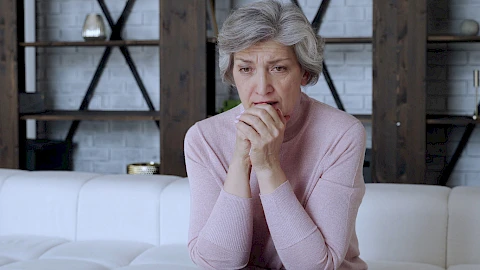
Anxiety Awareness Month is a time to focus on recognizing and addressing anxiety in our communities. When we think about anxiety, its impact on seniors often goes unnoticed. However, spotting signs of anxiety in older loved ones helps support their well-being. Family caregivers, adult children, or anyone who spends time with seniors must grasp and respond to anxiety to help loved ones live happier, more comfortable lives.
Anxiety in Seniors
Anxiety in seniors can manifest in various ways. Common signs include restlessness, irritability, fatigue, difficulty concentrating, and unexplained aches. Unlike normal age-related changes, chronic anxiety often accompanies intense worry or fear that disrupts daily life. Learn to distinguish between a senior moment of forgetfulness and consistent worry about memory loss that indicates anxiety.
Several factors can contribute to anxiety in seniors, such as chronic health conditions, medication side effects, or significant life changes like the loss of a loved one. Noticing these factors is a step toward offering proper support.
Immediate Steps to Alleviate Anxiety
When a senior loved one feels anxious, certain approaches can help calm them.
Deep breathing exercises work well. Encourage slow, deep breaths to ease the physical signs of anxiety.
Speak softly and calmly, and listen carefully to their concerns without judgment. Acknowledging their feelings can reduce distress.
Create a peaceful space by lowering noise, softening the lighting, and clearing clutter. Small adjustments to their environment can make a big difference.
Long-term Strategies for Managing Anxiety
Supporting a senior through anxiety often calls for lifestyle habits. Encourage regular physical activity to relieve stress and boost mood. Daily walks or chair exercises can help. Social involvement also benefits them. Suggest community events or clubs where they can meet others and form connections.
Keeping a routine adds comfort and predictability, which can ease anxiety. Stick to regular meal times, bedtime, and enjoyable activities. Sometimes, professional advice is needed. If anxiety lasts or disrupts daily life, seeing a mental health expert with experience in senior care offers personalized guidance.
Monitoring and Supporting Senior Loved Ones
Tracking anxiety triggers and patterns can help manage it better. A simple journal to note anxious moments and possible causes can reveal trends and solutions. Encourage open talks about feelings. Often, sharing worries reduces anxiety. Remind them it’s normal to feel anxious and that support is always available.
Build a support system by connecting with family, friends, or community groups. A strong network means your loved one has constant companionship and someone to talk to even when you’re not there.
Helping Seniors Live More Peacefully
Anxiety in seniors often happens, but it can be managed. Recognizing signs and offering immediate and ongoing support helps improve their quality of life. Remember to stay proactive and attentive to their needs.
If you're near Camp Hill, Palmyra, Harrisburg, Mechanicsburg, or Dauphin County, contact Senior Helpers Harrisburg for professional support and resources. We're here to help you and your senior loved ones navigate these challenges with care and compassion.